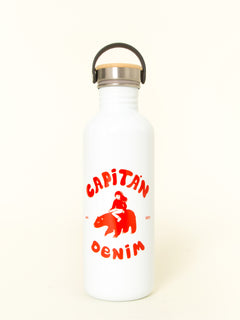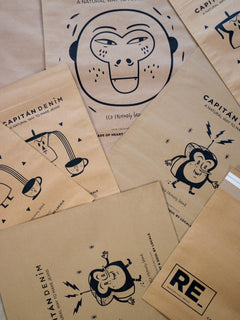Neo Recycling
Climate change is not an opinion, it is a fact. According to the Ellen MacArthur Foundation, the fashion industry emits 1.2 billion tons of greenhouse gases per year, and this figure is increasing. It is estimated that in China, at least 70% of rivers and lakes are already highly polluted by the textile sector. Furthermore, we take into account that the Earth's natural resources are limited and given their capacity, there are some that are renewed in months or years. Having all this data in hand, don't you think we should stop along the way and start producing and consuming more slowly? Without rushing, appreciating what we have and valuing everything behind a garment.
If you have come this far and taken a look at our sustainability content, you will see that, since we started our journey, we have not stopped trying to improve the way we work. The sustainability label is not just about making jeans with recycled cotton or using renewable energy, it goes much further. For this reason, we open one more point in everything that our work entails, we talk about Neo – Recycling, a research and development project of products and technologies with low environmental impact applied to the manufacturing process.
The project that will change the way we manufacture
Currently, the textile sector is evolving towards greater environmental sustainability in all phases of production; but all this without losing the essence of tradition and the quality of the products. This cocktail of tradition and R&D that, a priori, may be impossible, with studies and analysis, becomes a reality.
The Neo – Recycling project aims to investigate new materials for finishing garments, technologies and dyeing processes that allow the development of productions and finishes of much more sustainable jeans.
To take this step we revolutionize three activities:
1. Work with renewable materials in the manufacturing process that are low impact.
2. Implement new, more sustainable technologies, in addition to those we currently work with.
3. Develop and validate the solutions we have obtained to minimize our carbon footprint.
Use of renewable materials in the production process
Working with renewable materials at any stage of the value chain will allow us to reduce the environmental impact generated by processes and products. For this reason, we will begin to use new natural dyes of plant origin. In addition, we will also work with auxiliary products such as softeners, soaps or cationizers, among others, made with bio-based components, coming from natural sources such as resins and enzymes.
New more sustainable technologies
Thanks to the Neo-Recycling project we are going to work with new processes and technologies that allow us to obtain much more sustainable garments. From the manufacturing process, such as the transformation and revaluation of waste.
Furthermore, thanks to micro nebulization, we are going to create a completely sustainable dyeing process that will consist of using natural products, for example, dye with bacteria. This process consists of the extraction of color and concentration of microorganisms.
Do you remember the section where we talked about circularity? We told you what we did with our pre-consumer, post-consumer and waste management surpluses. With this project, we take another step towards circularity since we are going to manage our surpluses in a more sustainable way.
With the collaboration of the companies FERRE and RECOVER , we intend to recover our pre-consumer and post-consumer textile waste, to be able to reuse it in the manufacture of new garments. To ensure that all our surpluses return in the form of recycled fabric, it will be necessary to study the quality of the new yarn and whether they meet our quality standards. In this way, we would achieve a completely circular process.
Regarding waste management, thanks to the help of AITEX , we are going to develop a process that allows us to recover this waste so that it can be reused in the form of powder, which would result in new uses in other industries.
This project implies a methodological and conceptual revolution within our sector. Therefore, for us it is very important to launch the Neo-Recycling project since, with this process, we take another step towards sustainability.



